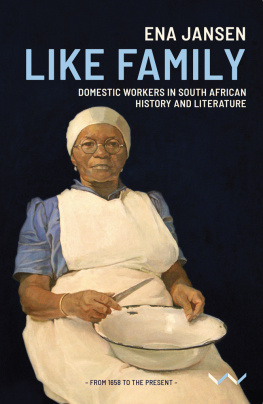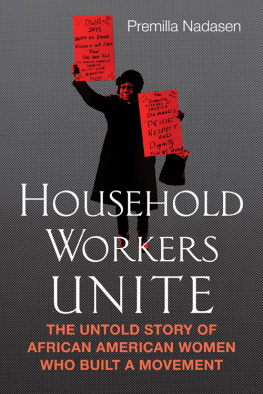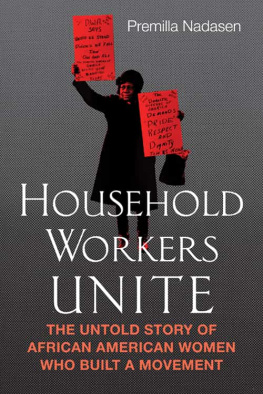2010 THE UNIVERSITY OF NORTH CAROLINA PRESS
All rights reserved. Manufactured in the United States of America. Designed by Kimberly
Bryant and set in Miller by Tseng Information Systems, Inc. The paper in this book meets the
guidelines for permanence and durability of the Committee on Production Guidelines for
Book Longevity of the Council on Library Resources. The University of North Carolina Press
has been a member of the Green Press Initiative since 2003.
Library of Congress Cataloging-in-Publication Data
Sharpless, Rebecca.
Cooking in other women's kitchens : domestic workers in the South, 18651960 /
Rebecca Sharpless.
p. cm. (The John Hope Franklin series in African American history and culture)
Includes bibliographical references and index.
ISBN 978-0-8078-3432-9 (cloth : alk. paper)
1. African American women household employeesSouthern StatesHistory. 2. Women
cooksSouthern StatesSocial conditions 3. African American womenSouthern States
Social conditions 4. Southern StatesRace relationsHistory. I. Title.
HD6072.2.U52S574 2010
331.4'816415dc22
2010015805
cloth 14 13 12 11 10 5 4 3 2 1
Contents
{1} I Done Decided I'd Get Me a Cook Job
Becoming a Cook
{2} From Collards to Puff Pastry
The Food
{3} Long Hours and Little Pay
Compensation and Workers Resistance
{4} Creating a Homeplace
Shelter, Food, Clothing, and a Little Fun
{5} Mama Leaps off the Pancake Box
Cooks and Their Families
{6} Gendering Jim Crow
Relationships with Employers
{7} If I Ever Catch You in a White Woman's Kitchen, I'll Kill You
Expanding Opportunities and the Decline of Domestic Work
Illustrations
The cook at Refuge plantation, Camden County, Georgia
An unidentified cook and a market delivery truck driver, Washington, D.C.
Easter, the cook for the C. A. Moers family, Fort Bend County, Texas
Domestic workers waiting for the streetcar, Mitchell Street, Atlanta
Mati, the cook for the W. W. Wilkes family, Waco, Texas
An unidentified cook with her employer's daughter, San Augustine, Texas
Betye Saar's The Liberation of Aunt Jemima
Preface
Twenty-two-year-old Cleora Thomas was not happy. Smart, pretty, energetic, with first-rate culinary training, she had more in mind for herself than being the second-floor custodian at Central High School in Muskogee, Oklahoma. When opportunity came to her, she jumped at it. Sixty-two years later, she wrote: Early in the summer of 1923, my Aunt Minnie came home for a weekend visit with the news that her employer's neighbor needed someone to take over their kitchen. My heart leapt to hear that she had recommended me; and it leapt again when Dad finally gave his consent for me to go. Thomas (later Butler) was on her way to a distinguished career as a cook in the wealthiest homes in Tulsa. To Butler, cooking for rich white people in the big city was better than sweeping floors at a school, the best job she could find in Muskogee.
For centuries, women like Cleora Butler have used domestic work as a means of leaving their old lives and starting new ones. In eighteenth- and nineteenth-century Europe, domestic work frequently served as a method for women to move from the countryside to the city. In the twenty-first century, it is a way for women to move from developing countries to wealthier nations. Between emancipation in 1865 and the civil rights movement in the 1950s and 1960s, African American women did domestic work, including cooking, to earn wages and support their families, biding their time until better opportunities opened. When those chances came, most of them took other types of jobs as quickly as possible.
The first purpose of this book is to look at the way that African American women such as Cleora Thomas Butler used domestic work, particularly cooking,
I concentrate specifically on cooks rather than domestic workers in general for several reasons. This study began as a part of a larger work on southern women who used cooking to push the boundaries of women's so-called spheres. While I remain interested in boardinghouse keepers, tearoom proprietors, caterers, and cookbook writers, the situations of African American domestic cooks differed substantially from those of the white women who worked in food services. And so this study took on a life of its own, defined by race and place. Like domestic workers in general in the American South, the women in this study were African American, hired almost exclusively by white housewives, and race shaped their labors significantly. They worked, not in the public, but in the private homes of their employers, largely isolated from their peers and nurturing work cultures.
Cooking differs from cleaning, laundry, and child care, the other types of domestic labor that African American women did, and it provides an excellent medium for telling the intertwined stories of African American women and the American South. Food preparation carries a great deal of weight in human society at large, in the postbellum South as in the present. Food is a significant cultural symbol, and women's involvement in its production indicates a great deal about the way a society functions. Historian Donna Gabaccia observed, Psychologists tell us that food and language are the cultural traits humans learn first and the ones that they change with the greatest reluctance. Humans cannot easily lose their accents after the age of about twelve; similarly, the food they ate as children forever defines familiarity and comfort.
THE LABOR OF DOMESTIC COOKS remained in some ways unaltered between the Civil War and the 1960s, and in other ways it changed significantly, in large part because of active contestation by the cooks themselves. Cooking was never easy, however, and women found themselves fighting powerful odds to create satisfactory work situations. Hence, the second purpose of the book is to discover how African American cooks successfully functioned within a world of extremely hard work, low wages, and omnipresent racial strife. They made homes for their families with enormous effort, and they comprised the largest group of African American women who left their own homes to go to white people's houses every day. As a group, they gained the most benefit and suffered most keenly from being sequestered in white homes on a daily basis. While many African Americans dealt with the indignities of Jim Crow by avoiding contact with white people as much as possible, cooks lacked that option. Rather, by being in close contact with white people all day, every day, these women had to come up with coping mechanisms of their own.
A THIRD, ORIGINALLY UNINTENDED purpose of this book is to refute the widespread popular stereotypes about African American cooks. I did not begin this project with that outcome in mind, but racist clichs surfaced at every turn and had to be dealt with. Other scholars have expertly parsed the Mammy and Aunt Jemima tropes, and I am chiefly interested in seeing through those images to the real lives beneath them. The stereotypes have been so pervasive, however, that I have constantly found myself working in opposition to them. And so they warrant brief discussion here.








